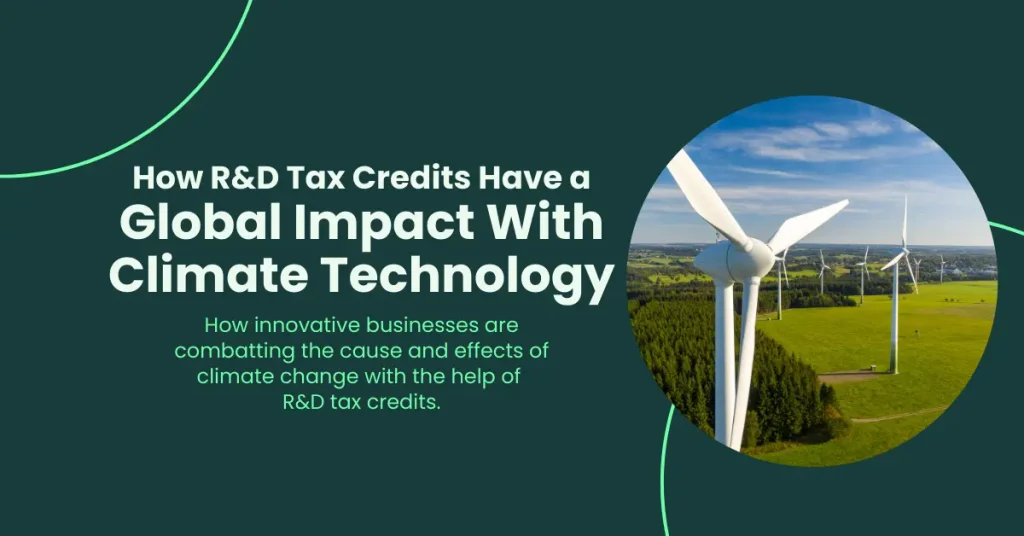How R&D Tax Credits Have a Global Impact With Climate Technology

Explore the world of climate technology – the research and development of tech that helps to combat climate change and to withstand the effects that it brings.
Learn how new trends will shape the future of the industry, how the UK is leading the charge with R&D tax credits, and how Alexander Clifford can aid in up and coming advancements.
In the domain of climate technology, the innovative prowess of research and development (R&D) is spearheading transformative advancements that are reshaping the landscape of sustainable solutions for combating climate change.
Adequate funding drives collaborative ecosystems enhancing cross-disciplinary interactions, essential for efficient technology transfer.
Anticipating future trends aligns with industry needs, serving as a catalyst for transformative advancements. And with the UK providing financial incentives for innovative businesses in the climate tech space through R&D tax credits, the room for advancement is wide.
The role of R&D in Driving Innovations in Climate Technology
Given the increasing drive for research and development in relation to climate technology, we have to question the financial impact that this will have across a variety of industries. With the staff costs, consumable items, subcontractors and more additional costs, research and development can become a financial burden for many companies looking to innovate with ecological solutions.
In the UK however, the governmental department HMRC has a financial incentive for companies that invest in the advancement of their sectors. This incentive goes by the name of R&D tax credits.
With the power to offset the financial restraints of research and development, R&D tax credits can aid in shaping the future of climate technology by:
- Encouraging innovation in renewable energy
- Supporting sustainable agriculture
- Accelerating energy efficient technologies
- Increasing investment in CCS (carbon capture and storage)
The Growing Importance of Climate Technology
Considering the fact that climate change is rapidly becoming a global challenge (with the United Nations even developing a series of 14 sustainable goals) the need for change is at an all time high. From the way we produce energy to the way we harvest our food, global climate challenges are highlighting the urgent need for solutions
Climate tech plays a pivotal role in addressing these challenges, with advancement paving the way for more sustainable practices and approaches around the world.
How Innovators are Advancing Amidst Climate Challenges
Due to the increased demand from both the public and the world’s governments to find solutions to our planet’s climate issues, innovators have been breaking boundaries and building relationships to rise against climate change.
While there is a mounting support for advancement in climate technology, there are a range of challenges in which these innovators face along their journey into research and development of this necessary tech, such as:
- High development costs
- Regulatory restrictions and policy hurdles
- Technical challenges
- Supply chain issues
Some of the challenges that are faced can be overcome with the collaboration of innovative businesses, allowing them to combine expertise and to better improve their respective industries.
The Impact of Climate Change on Various Industries
It’s ambitious to say that all industries can be impacted by climate change, however with the already evident impact on businesses across the globe, this may just be the case.
With extreme weather conditions having an impact on staff, infrastructure, supply chains and distribution channels, many industries are beginning to feel the negative impact of climate change, which only increases the demand for climate technology advancements.
To give you a visual, the following table highlights some of the sectors that are currently experiencing colossal changes due to the climate.
| Industry | Climate Impact |
| Agriculture | Crop yields due to extreme weather, livestock distress due to increased heat and water scarcity, increase in pests and disease |
| Energy | Renewable energy issues due to erratic weather patterns, reduced water available for nuclear power, infrastructure damage due to extreme weather |
| Construction and real estate | Property damage caused by extreme weather, increased insurance premiums and construction costs to maintain infrastructure, drastic change to desirable locations due to changing weather systems |
These climate impacts lead to significant economic implications, health consequences, and necessitate policy responses for building infrastructure resilience. Technological integration plays a vital role in developing innovative solutions to combat these challenges.
As climate change continues to affect sectors globally, proactive measures through climate technology advancements are imperative for a sustainable future.
Current Trends in Climate Technology Research and Development
In the domain of climate tech research and development, the emphasis is on creating impactful and scalable solutions that not only combat climate change but also pave the way for a more sustainable future.
Through sustainable innovation, green technology advancements, securing adequate research funding, and fostering industry collaboration, the current trends in climate tech research and development are geared towards addressing the urgent environmental challenges we face.
Climate Technology Trends: Renewable Energy Innovation
One of the greatest contributors to climate change is the way in which we produce energy. In an effort to find greener renewable energy options, many businesses in the energy industry are investing in research and development projects that explore more effective ways to harness energy from nature. This is what’s driving the exploration in the following renewable energy options:
- Solar power
- Wind energy
- Hydropower
The idea of working on these greener energy technologies is not only to reduce the carbon emissions, but also to drive down consumer price which may in turn have a positive economic impact.
Climate Technology Trends: Agricultural Advancements
Propelled by innovative research and development efforts, sustainable agriculture is revolutionising farming practices.
With a focus on advancing sustainable agricultural practices, innovative businesses investing in agricultural R&D are honing in on the following aspects in order to advance climate technology:
- Enhanced crop management: leveraging data for precise nutrient application
- Improved soil health: utilising agro-ecological methods for sustainable land use
- Efficient water conservation: implementing technology for optimised irrigation
- Maximised yield optimisation: enhancing production through innovative practices
Considering agriculture is a vital necessity for every human being on the planet, the industry is facing increasing pressure to overcome the challenges imposed by climate, leading to some incredible solutions.
Climate Technology Trends: Enhancing Energy Efficiency
With infrastructure demands and outdated ways of storing energy, there is a high demand on energy efficiency.
From the way that energy is stored to the way it is distributed, innovation in this area must not only seek to optimise energy consumption, but it must also foresee the impact of a rapidly changing climate – for as we’ve established, infrastructure is falling victim to erratic and often extreme weather.
With this in mind, businesses involved in energy efficiency are dedicating research and development teams to the following:
- Energy conservation technologies
- Innovative insulation solutions
- Smart thermostat systems
- Demand response strategies
In addition to these focus areas, the industry is also looking towards the development of smart grids and innovative management systems with the aim of reducing energy waste – and in turn reducing the energy sector’s carbon footprint.
Climate Technology Trends: Refining CCS (Carbon Capture and Storage)
Using technologies that actively reduce the amount of carbon released into the atmosphere, CCS (carbon capture and storage) advancements have the ability to vastly reduce the output of carbon emissions, ultimately having a significant impact across a plethora of industries.
Those at the forefront of CCS research and development are paving the way towards a more sustainable future. The current key focuses for driving advancement in this field are as follows:
- Development of enhanced carbon capture efficiency through novel materials
- Integration of CCS with renewable energy sources
- Automation and AI for optimised CCS operation
- Development of miniaturised CCS systems
Given the magnitude of CCS, experts face a wide variety of challenges in developing these technologies, leaving a lot of room for innovative solutions that can be sought only through further research and development.
R&D Tax Credit Eligibility for Climate Technology Projects
The basic eligibility criteria for an R&D tax credit claim is pretty straightforward, in that HMRC states that your business must be investing in research and development that does the following:
- Aims to make an advance in your industry
- Aims to overcome scientific or technological uncertainty that cannot be easily overcome by experts in the field
- Tries to overcome aforementioned scientific or technological uncertainty
Given the fact that the field of climate technology is centred around advancement, if your business has been involved in the development of climate tech then it’s likely that you meet the basic requirements for R&D tax credit eligibility. To be sure, let’s take a brief look at potential qualifying activities.
Qualifying R&D Tax Credit Activities for Climate Technology
Innovative climate tech projects that push the boundaries of research and development are prime candidates for securing R&D tax credits. Here are some examples of eligible climate tech projects:
- Development of enhanced solar panels that withstand extreme weather
- Development of chemical absorbents for carbon capture
- Creation of software that enhances energy grid performance
- Development of sensors that monitor soil moisture and nutrient levels
These are prime examples of how innovative businesses can enhance their industry, allowing them to adapt to climate change while also working to slow its progression.
Tips to Maximise Your R&D Tax Credit Claim
Understanding your claim and how it aligns with HMRC’s guidelines is the ultimate way to maximise your R&D tax credit claim. This entails:
- Keeping up with HMRC policy and legislation
- Reviewing and maintaining your R&D related documentation
- Consulting with an R&D tax credit specialist
This final point could be pivotal in your claims process, as consulting with an R&D tax specialist will ensure that you get accurate advice that aids in your claims process.
In conclusion, the future of climate technology is inherently bright. With innovative advancement being urged upon various industries, there is a lot of room for improvement.
From the depths of the earth in sustainable agriculture to the vastness of space with solar energy, the world is in need of technological development that can help to protect the planet from the rapidly changing climate.
How Alexander Clifford Can Help With Your R&D Tax Credit Claim
As leading R&D tax credit specialists, our experts have helped over 2,400 businesses to compile and submit their R&D claims.
Our informed insight into the HMRC and R&D tax credit policy, allow us to give accurate and in depth information that helps to simplify the claims process. That’s what makes us your trusted choice for R&D tax credits.
Save time and start your claim with an R&D tax credit specialist by filling in the contact form below, or if you’re reading on a mobile device, tap the call button to speak to one of our experts.







